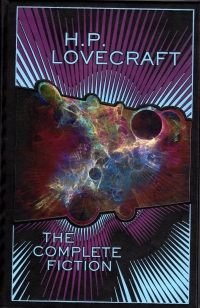A couple of months ago I wandered into a Barnes and Noble and walked out with yet another handful of books because I have a very strange and dangerous compulsion. While I was there I picked up a book published by Barnes and Noble that contains (at least according to the book) the entire collection of every fiction story written by H.P. Lovecraft that still exists. For my uninitiated readers, H.P. Lovecraft was a horror and supernatural fiction writer in the 1920's and 30's who wrote a number of short stories and novellas, a few of which have been lost because they were mostly published in pulp magazines. What Lovecraft is remembered for is his groundbreaking exploration into the then-new idea that the world was several billion years old and the possibility that other intelligent races had preceded humanity as the dominant lifeform on earth, and numerous other species would follow humanity in the future. The more memorable of his ideas which were adopted by and expanded upon by other writers include C'thulu, the concept of the Outer Gods, and that terrible tome, the Necronomicon. Lovecraft is definitely influential and has practically defined his own genre of literature. Despite his contributions to the body of American literature and its groundbreaking nature, I feel like most of Lovecraft's stories have become terribly dated and don't hold up as well to a modern reader. There were stories I enjoyed within this body of work but I found myself struggling with the vast majority of them.
Some of the stories that I really liked in Lovecraft's collection were the much shorter stories which reminded me a lot of episodes of the Twilight Zone where a situation is set up, possibly with strange rules, and at the end of the story there's a sudden twist that changes the situation dramatically. As an experienced Twilight Zone watcher and predictor of plots I saw quite a few of these plot twists a long way off, but it was still enjoyable and I had a certain amount of fun in guessing how the plot was going to end.
Really I think that Lovecraft's shorter stories are much better because he remains concise and there isn't as much of a build-up to his rather characteristic twists which prevents the story from getting boring. In some of the longer stories I saw the ending coming so far ahead that I just wanted the story to end, or I felt so frustrated with the slow pacing of the story that I didn't even care about the twist at the end, I was just glad that it was over. A particular example is At the Mountains of Madness. Many other readers consider it to be one of Lovecraft's greatest works and is certainly among his longest but I found myself utterly frustrated with the almost plodding pace of the story and the rather sudden end. I think a lot of this is just the older writing style which is something I struggle with in a lot of the older books I read. Lovecraft especially enjoys his purple prose and being rather verbose, which adds to the challenge of reading an already old-fashioned writing style. In longer stretches it became really hard to stick with Lovecraft, but I found him rather enjoyable in small doses.
Probably the most frustrating thing for me is the fact that in a number of these stories the horror is that intelligent species other than humanity have inhabited the planet, currently inhabit it, or will inhabit it in the future. Personally my response to this statement is "... and?" And really I think that's a result of me being a reader after generations of science-fiction writing. Aliens are now almost commonplace and it's not new or shocking to say that there were ancient aliens. Heck, Stargate ran off of the entire premise that many mythologies are based off of aliens visiting earth. To be fair the idea was probably groundbreaking at the time and was shocking to many readers at the time, much like contemporary advances in science had shaken long-standing assumptions about the world. Unfortunately, to a twenty-first century audience his once-groundbreaking stories are now commonplace and don't stand out except for the name of the author.
Overall I personally would recommend reading some of his short stories, generally the stuff shorter than thirty pages. I found that if the story ran longer than thirty pages the writing style made the story drag considerably and I had trouble staying focused on the book. If you like the short stories you can definitely try the longer ones, and there are plenty of places where you can read them.
- Kalpar


No comments:
Post a Comment